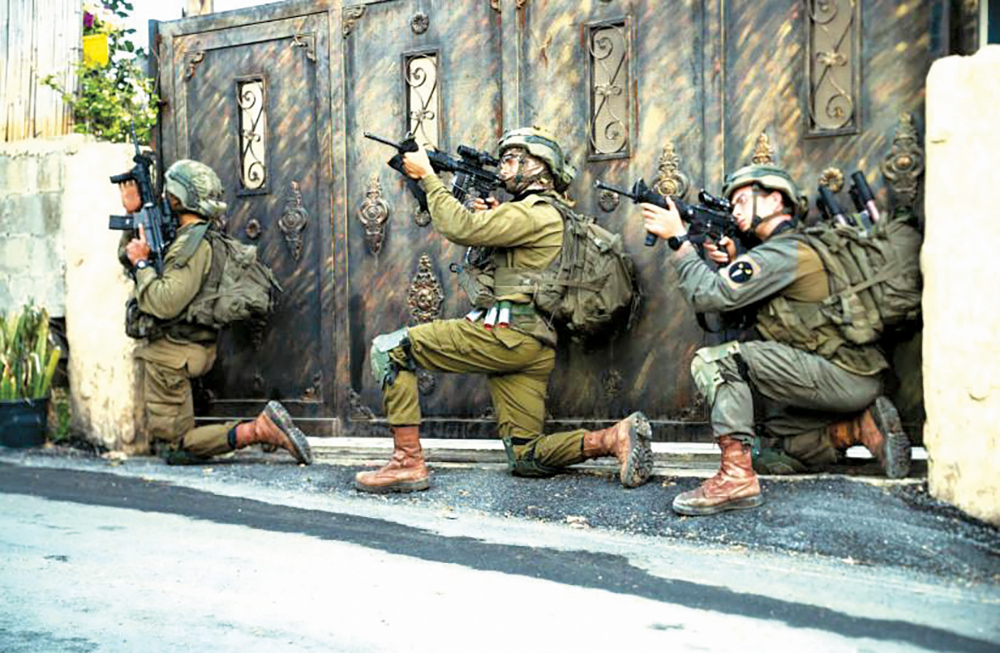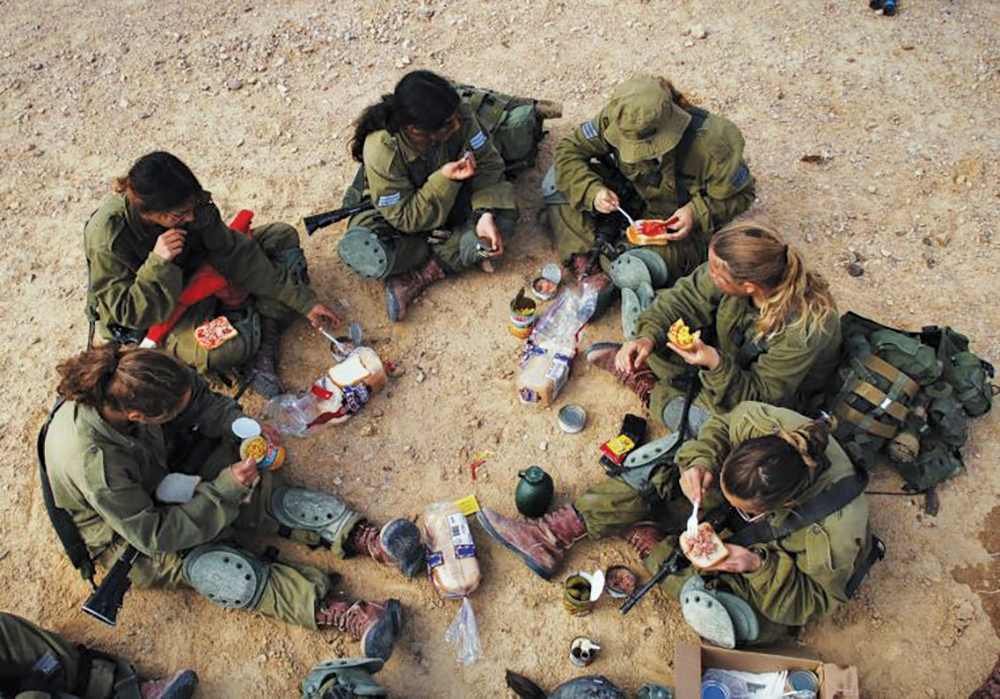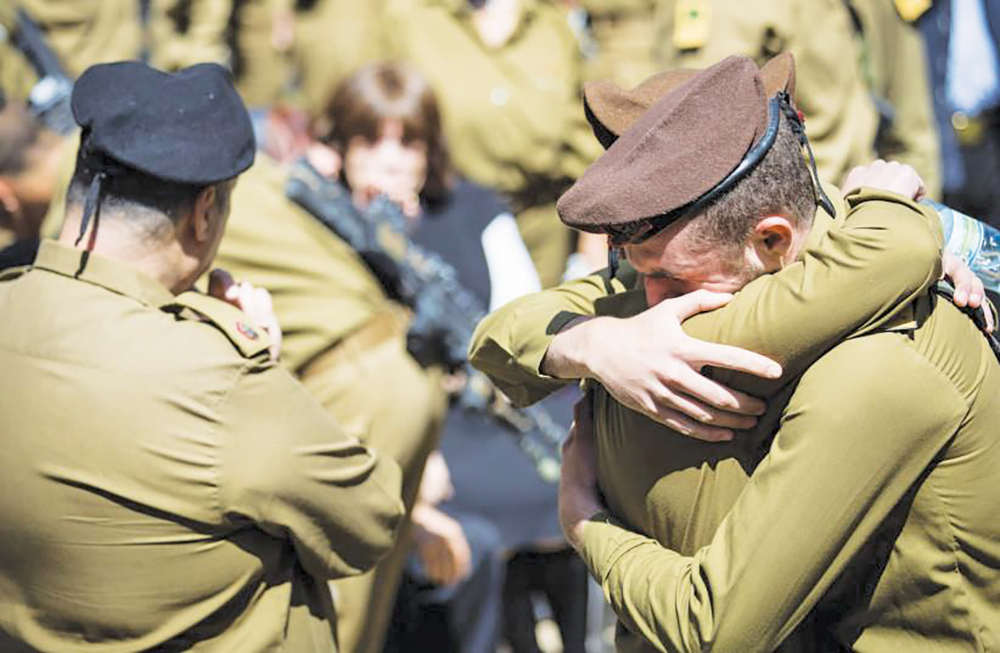Parents of combat soldiers, we know the risk, we feel pride and unfettered Zionism. We just never speak about it. It’s the proverbial elephant in the room.

(Credit: IDF)
By Hazel K. Brief/JPost.com
It’s the call no parent of a combat soldier ever wants to get. It’s the thought that is in the back of your mind like a silent song you wished you could get out of your head.
It’s 2 a.m. on Monday. I hear my husband speaking to our youngest child, who is in a special army unit. It’s 2 a.m.; this can’t be a good sign. My husband reports in a groggy voice that our child has a few cuts on their legs and is going to the hospital.
Flashback two years ago when that same child is standing in front of us at the meeting point to board the bus to the army for the first time. The air is thick with parents, grandparents and siblings hugging and saying goodbye to their soldier children. Some parents smoke, some eat, all with deep watery eyes.
They call my child’s name; we watch my child walk away and we all sigh–not sure what will be but knowing that we are immensely proud of this child’s efforts to get accepted to a special unit and serve our country like all our other children have done before. This is part and parcel of our aliyah integration, being an Israeli, nothing more.
We are like every other combat soldier’s parents who have come before us. We are the same. Parents of combat soldiers, we know the risk, we feel pride and unfettered Zionism. We just never speak about it. It’s the proverbial elephant in the room.
The Dreaded Phone Call
At 2 a.m., this elephant roared loudly, not just for us, but for all the parents in our child’s unit and for all the other combat soldiers as well.
The phone rang again a moment later. This time I answered. It’s my child again, who says, “Ema, I’ve been injured. I am in the ambulance, meet me at the hospital.” The line goes silent.
I turn to my husband and begin to bark out orders as if by osmosis via the cell phone. I have become the commanding officer and my husband is a soldier. I tell him we are to dress and leave for the hospital now. He is still in a sleepy fog and asks why, as our child told him there are just some cuts.
I tell my husband no one goes to the hospital in an ambulance at 2 a.m. for some cuts….We need to leave now. I am not sure how I am thinking straight at 2 a.m. and why I am in military mode. Maybe I am trying to take control of an absurd and uncontrollable situation the only way I know.

(Credit: Lone Soldier Center in Memory of Michael Levin)
I am a terrified mother and decorated military officer at the same time, just like all the other parents of combat soldiers who came before us.
I continue to bark out orders to my subordinate: “Bring a sweatshirt, as hospitals are always cold. I will get the thermos, you make the coffee and grab some water.”
In seconds we are in the car. As if this was a drill we had practiced over and over again–military style. Our precision is seemingly flawless, like the army had somehow prepared us for this moment in time.
But we have no experience with this. No one taught us what to do. We are just parents of a soldier driving to the hospital at 2 o’clock on a Monday night.
This is not a drill. This is a drive of the unknown. It is at once familiar and strange, quick and slow, at the same time, as at 2:15 a.m. there are no cars, yet we seem to creep along the highway–even though I am driving quickly. Time is standing still and racing, and we are still not at the hospital.
Diligently my husband is checking all the news sources, maybe there is something there? And what will that do for us? We have this enormous need to control, to know, to understand what is happening. At 2:59, as we are getting closer to the emergency room, we turn on the 3 o’clock news–maybe something there will ease our immense anxiety, fear and worry.
Why I think the news would ever offer up any comfort is beyond me. But we are not logical at this point. We are scared parents of a soldier – just parents, and nothing else.
The news proves to be of no comfort or understanding.

We pull into the parking lot and step out of the car… everything is slow… a young female soldier meets us right next to our car and asks if we are “X’s” parents? We say yes, as a deep shiver runs down my spine–why does this soldier know who we are? I feel my legs buckle. Why is she meeting us?
“How is our child?” I say the words with no effect or emotion and don’t even recognize my voice at this point. She answers that she doesn’t know, then I ask if anyone else in the unit was hurt, she says no. I breathe a sigh of relief.
How we get from the parking lot to the ER I have no idea. As if we are being carried by some other force.
We are met by two other members of the unit who also don’t know what has happened–or if they do, they are not sharing it with us. They ask us simple questions, how old are our other children, and which number child is “X” in the family.
I am answering these questions as if they are going to get me closer to seeing my child and making certain all is okay. So, I go along with the charade of keeping us busy but inside I am cringing with anxiety and fear, all the while wearing my military face and stance. They keep asking us questions and more questions, and I just feel so tired, and I don’t want to answer any more questions.
I just want to see my child.
While only a few minutes pass, it seems like an eternity–just like the ride here–a mix-up of time and space that we can’t understand or control.
I just want to see my child.
We see our child being skirted past us–awake. My child looks me in the eye and says, “Everything is okay,” and then is taken for a CT.
We wait again. Long time, short time, I have no idea what time.
We are then taken to the ER and my child keeps telling me all is okay.
As the middle of the night continues to unfold, we understand our child has injuries that are serious but thank God not life-threatening. They will need to do surgery, but it is not urgent.
They assure us of a full recovery in time, but it will take time.
We breathe a deep slow breath at this news… but wonder if we will make a complete recovery in time.
It’s just like in the news…. The soldier is in a hospital bed and officers make a pilgrimage to the bedside to hear “the story.” They begin to go over in detail what happened, and we listen intently, hearing for the first time what our children do. This is our child and everyone’s at the same time.
And think to myself, what were we doing when we were 22?
We inhabit a strange paradoxical sphere–experiencing fear, anxiety, worry, pride and Zionism all wrapped up together. Just like our experience with time, both fast and slow.
Post-surgery, we watch and listen as soldiers crowd the room supporting, listening and loving not only our child but all of us. We are one family, these soldiers in the room with us, these children, they are our children too. They are both someone else’s child and ours at the same time.
I turn to my husband and this time wonder out loud, what were we doing at 22? We are humbled.
This is the story of any parent of a combat soldier. At the same time, this is the story of my family and my child. We are once individuals and once an entire society.
This drill of phone calls, hospital, surgery, physical therapy is everyone’s story too.
We are the lucky parents and family; we get to take our soldier home.
This moment of gratitude, of deep thankfulness to the Almighty, is not lost on us. It is heavy within us. Pausing to be present with the thought is almost too much to take standing up. I feel the need to sit.
It is so present and weighty that it makes it difficult to talk and express anything. Shock gratitude is a phrase that comes to mind. Can I move one leg after the other?
We are profoundly aware that this could have ended another way. Shock gratitude.
So, we gather ourselves and move forward, wheelchair and crutches at home, a pilgrimage of more soldiers to our house, as well as a never-ending supply of our child’s local friends who have been together since they were in preschool. They too all serve in special units. Their mothers bring cakes and hugs. Their mothers look deep into my eyes and feel what I feel and understand. My child is their child, their child is mine.
And this is what you do if you are the parent of a combat soldier.
You carry on. You hold fear, anxiety and all “the what if’s,” close to your heart, filling your eyes with wet heavy tears. You also hang onto the immense gift you have been given by the Almighty, to treasure, nurture, heal and eventually let go on its way.
And you take another deep breath.
Our child will return to their unit the same soldier that left; but at the same time be completely different.
We too will return to our familiar parent-of-a-soldier routine…. Sunday morning drop-offs and Thursday afternoon return homes–only now it will be completely different.
That immense angst, apprehension, and worry are forever intertwined with love, honor and Zionism. This will follow us for a very long time.
We are this soldier’s parents.
May God bless and keep all our soldiers safe.
The writer is a clinical social worker/ADHD coach.












